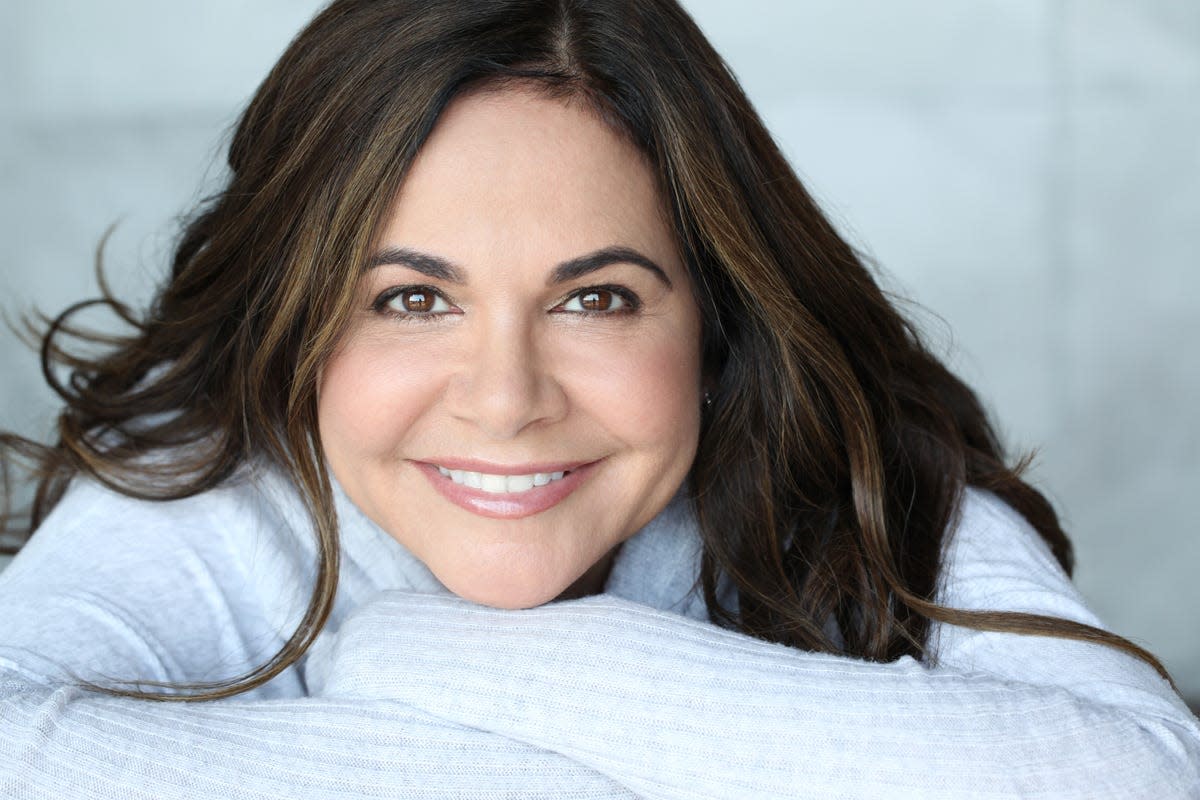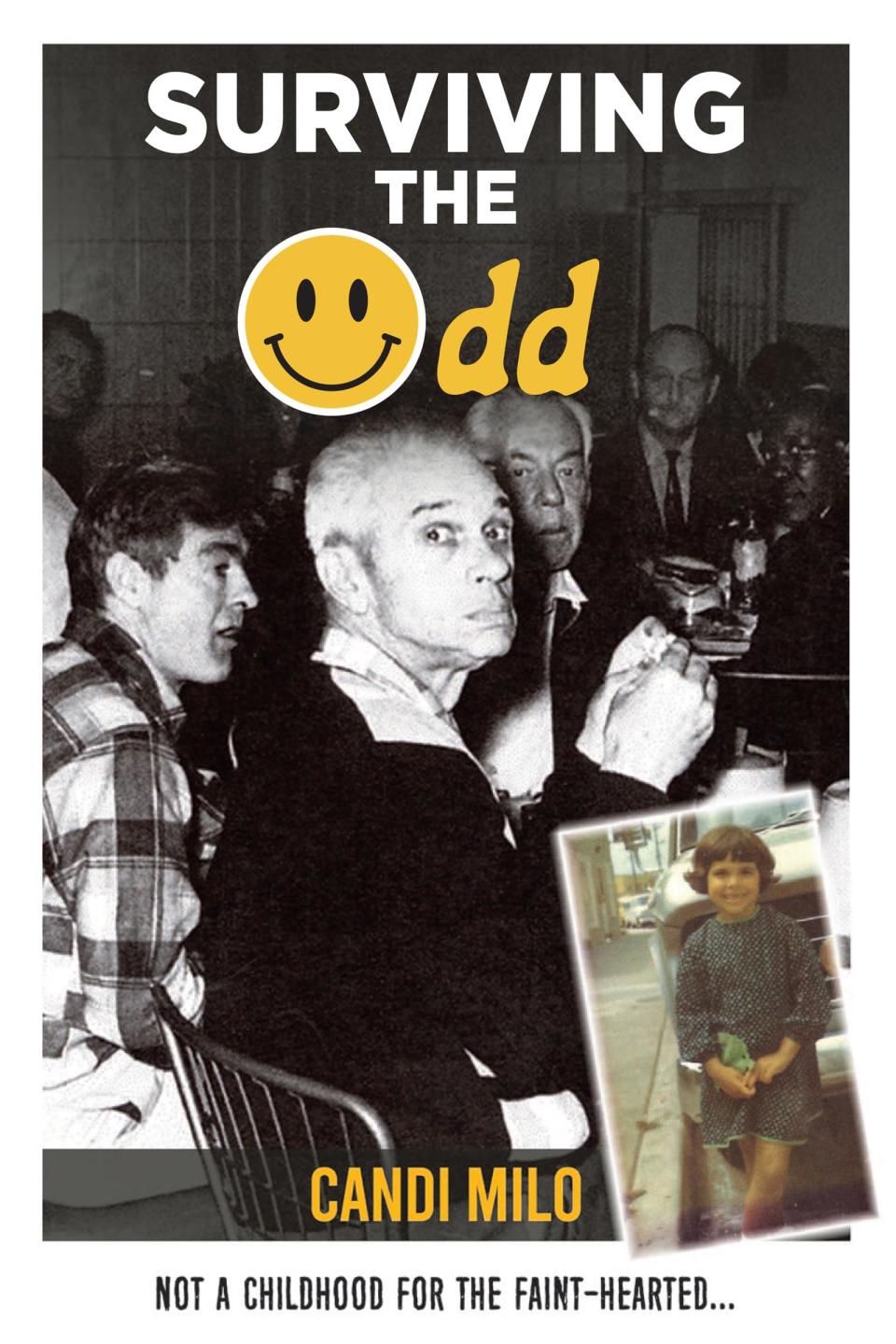Writing 'Surviving the Odd' helped Cathedral City native find her authentic self

- Oops!Something went wrong.Please try again later.
When Candi Milo was just 7 years old, her prominent comedian/singer father, Tony Milo, left show business for a higher calling. That calling was opening Milo Arms, one of the first California board and care homes to assist and shelter developmentally disabled and emotionally disturbed adults.
This was back in 1968, after the State of California had deinstitutionalized most patients in state hospitals. Some of the suddenly homeless wound up at Milo Arms in San Jose, where Milo’s family had been living. The new tenants and the experiences caring for them was an eye-opener for Milo, who recounts her darkly comedic childhood in “Surviving the Odd” (New Haven Publishing).
Milo, who was born in Cathedral City and now splits her time between L.A. and the Coachella Valley, is a successful voice-over actress. “Surviving the Odd” is filled with tales of her “inappropriate” childhood as seen through her 7-year-old self.
“Back in the 1970s, you never saw the people we housed out on the streets. They were almost fiction to most people,” Milo says of the time. “They’d been locked away for so long that no one witnessed these folks, in broad daylight, chattering away, or walking in circles, or perhaps even slightly frozen. The general public’s fear and mistrust was palpable.
“And to be 8 or 9 years old, having to defend an adult from taunts and harassment, was a heavy thing,” she adds. “I felt like the youngest world-weary person in San Jose.”
Milo may have felt weary, but she had a big heart. Her fervent prayer every night was that someone in Milo Arms would get better — better enough to move out and move on, to give her hope.
“Not hope in the sense that Milo Arms would close because we'd run out of residents,” she’s quick to note, “but hope that their lives would be better one day; that they’d find love and acceptance, and that they'd be able to do things they always wanted to do.”
Milo, a passionate and honest writer, fills “Surviving the Odd” with depth and levity in equal measure. The first chapter, “These Hallowed Halls of Lithium,” recounts how she and her siblings were watching The Three Stooges on TV, waiting for their father to return from Agnews State Mental Hospital, where he’d picked up the family’s future guests. The Milo clan had been living in an ex-fraternity house just a few blocks from the San Jose State Campus.

Other chapters — from “Trick or Clozapine!” and “Norman Rockwell We Ain’t” to “We’re Gonna Feed the Hate Out of You” and “Keep Your Arms and Legs Inside the Moving Life” — vividly depict the coming and goings at Milo Arms.
Milo would go on to “survive” her unconventional childhood as the title of her book tells us. She’d become one the busiest voice-over actresses in show business, in fact, taking the creative baton from the late June Foray as the voice of Granny for all Warner Brothers Animation projects. Chances are, you’ve heard her voice growing up in any number of animated television shows and movies.
Last year, Milo played Granny in "Space Jam 2: A New Legacy" with LeBron James. Countless other roles pack her entertainment bio. An Annie Award nominee, best known for voicing Dexter in "Dexter’s Laboratory" and The Flea in "Mucha Lucha," along with thousands — literally — she also starred with Jennifer Holliday in the first touring production of “Dreamgirls,” directed by the Michael Bennett.
When asked what sparked the idea to pen a life story, Milo is candid.
“It was the day I realized I was living an inauthentic life,” she admits. “I do cartoon voices. I make voices very easily by tapping into real parts of me that other people could never know or watched a thought process like that. But what I couldn't do — ever — was a character that was really me.”
A major turning point arrived.
“I was sitting at a party,” Milo shares, “and somebody said, ‘Oh, you should have Milo tell you her life story,’ and I started to say, ‘Well, my dad was this hard-working nightclub performer,’ and the person cut me off. Then he told the ‘Hollywood’ version. And I realized he’d heard that from my nightclub act, and that I’d been going my entire life for a punchline — setting it up, you know, to maybe do it at the Purple Room; do my club act and make fun of this childhood.
“[My past] was always why I'm single and live alone — that was always the punchline,” she goes on. “As if I didn’t make all the choices in my life; that I wasn’t responsible for anything because this is how I grew up. I decided I had to live authentically and that I wanted to tell the story of my dad.”
After Milo’s mom passed away in Palm Desert in August, 2021, she was sorting through paperwork and came across documents verifying her father’s trips to a state hospital and dealings with various social workers. Suddenly, the pieces started falling into place, and she felt “lead” to write about her life.
“Then I got myself liability insurance and told the absolute unvarnished truth,” she quips, hoping the book sheds light on the issues of developmentally disabled and emotionally disturbed adults, an era that turned its head on them, and some of the 350 individuals or so that were housed in Milo Arms.
“There are no articles in any newspapers about the epidemic and the release [of state hospital patients],” Milo notes. “My research was going to microfiche at the San Jose Public Library and looking for essays from students who attended San Jose State at the time; those who were talking about what was happening in downtown San Jose.”
Long after Milo Arms, Milo returned to live with her parents when she was 19 — they’d been living in Indian Wells at that point — and “learned to live out the seasons,” especially Coachella Valley’s summer heat and wind.
“My father used to say, ‘follow the sun — go to sleep early and rise early to get the most from the desert,’” she says. “Did I mention I was 19? So, that didn't happen. But I did join a Jack LaLanne's spa in Palm Desert because they had a nap room where I could lie in the dark and didn't have to listen to my dad play Annunzio Paolo Mantovani records.”
She laughs. “Man, what I wouldn’t give to have those days back. But on those nights when the mountains slowly fade to magenta, then purple, and the winds die down, there is a stillness and beauty that still speaks to me. I’ve always thought I would return to live out here. I feel better when I am ‘home.’ Calmer. Healthier. Funnier.’”
Milo’s depth, insight, and wit shine through as much in conversation as they do on the pages of her book. She credits the Coachella Valley for drawing out her creativity.
“The life for artists of all kinds in the area is vibrant and alive,” she muses. “There’s always something to do. Some new exhibit, concert, play, musical, bookstore, or whatever to explore. The pace may be slower here, but the thrills aren't.”
“Surviving the Odd” is available on Amazon, at Barnes and Noble and most booksellers.
Greg Archer writes about change agents, happenstance and the entertainment industry. His work has appeared in the USA Today Network, Palm Springs Life, Huffington Post, The Advocate and other media outlets. His memoir, "Grace Revealed," chronicles his Polish family's odyssey during World War II. gregarcher.com.
This article originally appeared on Palm Springs Desert Sun: Cathedral City native explores her complex past in 'Surviving the Odd'

